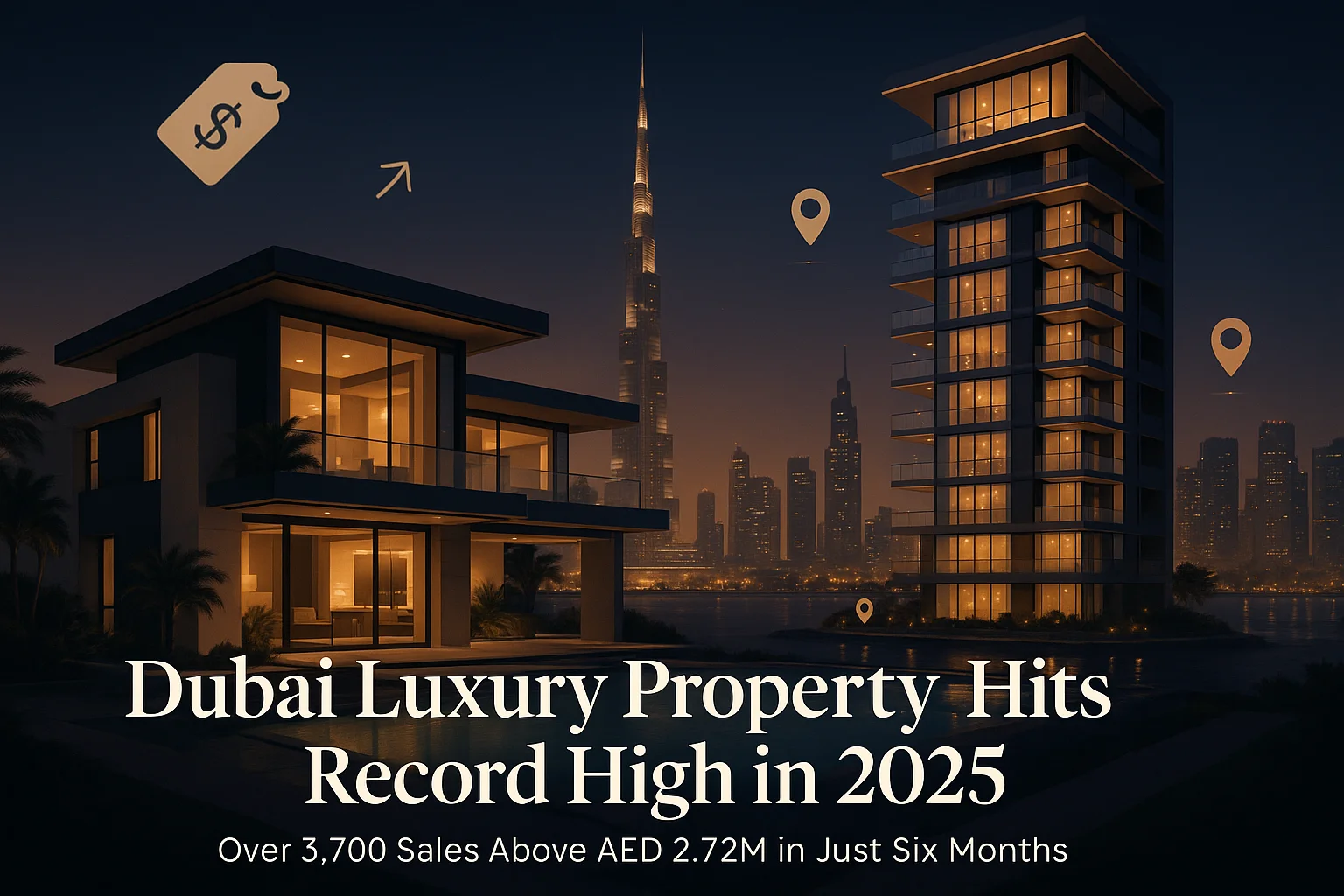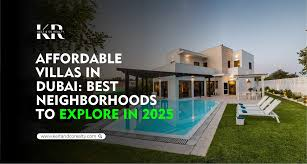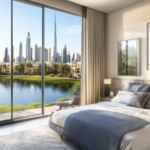Now Reading: Dubai Luxury Property: Top Emirates Zones Dominating Sales
-
01
Dubai Luxury Property: Top Emirates Zones Dominating Sales
Dubai Luxury Property: Top Emirates Zones Dominating Sales

Table of Contents
Picture yourself owning a breathtaking villa in Dubai, with floor-to-ceiling windows framing a glittering skyline or serene golf course, earning tax-free rental income, and watching your investment soar in value. Dubai’s luxury real estate market is a magnet for affluent buyers, offering no personal income tax, capital gains tax, or annual property taxes unlike cities like London or New York, where taxes can devour 15-40% of returns.
The UAE’s dirham, pegged to the U.S. dollar, eliminates currency risk, and residential sales are VAT-exempt, saving tens of thousands. With a 5% population surge, 25 million tourists, and 5-8% price appreciation expected in 2025, Dubai’s 5-8% luxury rental yields outshine global hubs like London (2-4%) or New York (3-4%).
Properties over $545,000 qualify for a 10-year Golden Visa, adding residency perks. This article explores three top Emirates zones dominating luxury property sales in 2025 Dubai Hills Estate, Emirates Hills, and Palm Jumeirah helping you choose the best areas to invest in Dubai’s thriving high-end market.
Why Dubai’s Luxury Market Shines
Dubai’s tax-free structure is a dream for luxury investors. With no personal income tax, a $1 million property yielding 6% ($60,000 annually) stays fully yours, compared to $42,000-$48,000 after taxes elsewhere. Zero capital gains tax ensures a $500,000 profit on a sale is untouched, unlike $100,000-$140,000 lost in the U.S. or UK. Annual property taxes, common at 1-2% ($10,000-$20,000) in other markets, don’t exist in Dubai.
Residential sales are VAT-exempt, saving 5% ($50,000-$100,000) on purchases, though off-plan purchases may incur recoverable VAT. The 9% corporate tax, introduced in 2023, doesn’t apply to individuals, and free zone companies with qualifying income face zero corporate tax, saving $5,000-$20,000 yearly. With 58% of buyers being foreign nationals, flexible payment plans, and a 2040 Urban Master Plan fueling growth, Dubai’s luxury market is a global leader for high-net-worth investors.
Dubai Hills Estate: Luxury With Strong Demand
Dubai Hills Estate, a freehold free zone, is a powerhouse in luxury property sales, driven by its blend of elegance and lifestyle. Offering 2-6 bedroom villas and apartments priced from $408,375 to $2.18 million, it delivers 5-8% rental yields. Projects like Emaar Collective 2.0 boast golf-course views, Dubai Hills Mall access, and top schools, attracting affluent families and executives. A $1 million villa yields $60,000-$80,000 tax-free annually, versus $42,000-$56,000 elsewhere. With 28.7% villa price growth, selling it for $1.5 million yields a $500,000 tax-free profit, saving $100,000-$140,000.
Initial costs include a 4% DLD fee ($16,335-$87,200), 2% broker fee ($8,168-$43,600), and a 10% deposit ($40,838-$217,800) with a 70/30 payment plan. Off-plan purchases may incur a 5% VAT ($20,419-$108,900), recoverable via Federal Tax Authority (FTA) registration for $500-$1,000. Annual maintenance fees are $5,000-$10,000, and landlords pay a 5% municipality fee ($3,000-$4,000).
A free zone company eliminates corporate tax on up to $174,400 in rental income, saving $15,696 annually. U.S. investors can deduct depreciation ($14,836-$79,273) and management fees ($3,000-$8,000), saving up to $29,451 on U.S. taxes. With high demand from expatriates and Golden Visa eligibility, Dubai Hills Estate dominates luxury sales for its prestige and growth.
Emirates Hills: Exclusive Ultra-Luxury Retreat
Emirates Hills, a freehold free zone, is Dubai’s most exclusive neighborhood, leading luxury sales with its bespoke villas. Offering custom-built 5-7 bedroom villas priced from $2 million to $10 million, it delivers 5-7% yields. Properties feature private pools, landscaped gardens, and proximity to Emirates Golf Club, attracting ultra-high-net-worth buyers. A $3 million villa yields $150,000-$210,000 tax-free annually, versus $105,000-$147,000 elsewhere. With 5% price growth, selling it for $4.5 million yields a $1.5 million tax-free profit, saving $300,000-$420,000.
Initial costs include a 4% DLD fee ($80,000-$400,000), 2% broker fee ($40,000-$200,000), and a 10% deposit ($200,000-$1 million) with a 70/30 payment plan. Off-plan purchases may incur a 5% VAT ($100,000-$500,000), recoverable via FTA. Annual maintenance fees are $10,000-$20,000, and landlords pay a 5% municipality fee ($7,500-$10,500). A free zone company eliminates corporate tax on up to $174,400 in rental income, saving $15,696 annually, or small business relief saves $13,500 on $150,000. U.S. investors can deduct depreciation ($72,727-$363,636) and management fees ($7,500-$15,000), saving up to $87,273. With unmatched exclusivity, Emirates Hills is a top choice for elite buyers.
Palm Jumeirah: Iconic Waterfront Luxury
Palm Jumeirah, a freehold free zone, is a global icon dominating luxury sales with its waterfront villas and apartments. Offering 3-7 bedroom villas and penthouses priced from $1 million to $5 million, it delivers 5-7% yields. Projects like The Royal Atlantis feature private beaches, luxury hotels, and skyline views, attracting wealthy tourists and residents. A $2 million villa yields $100,000-$140,000 tax-free annually, versus $70,000-$98,000 elsewhere. With 6% price growth, selling it for $3 million yields a $1 million tax-free profit, saving $200,000-$280,000.
Initial costs include a 4% DLD fee ($40,000-$200,000), 2% broker fee ($20,000-$100,000), and a 10% deposit ($100,000-$500,000) with a 60/40 payment plan. Off-plan purchases may incur a 5% VAT ($50,000-$250,000), recoverable via FTA. Annual maintenance fees are $8,000-$15,000, and landlords pay a 5% municipality fee ($5,000-$7,000). A free zone company eliminates corporate tax on up to $174,400 in rental income, saving $15,696 annually. U.S. investors can deduct depreciation ($36,364-$181,818) and management fees ($5,000-$10,000), saving up to $43,636. With high tourist demand and short-term rental potential, Palm Jumeirah leads luxury sales.
Strategies to Maximize Luxury Returns
To optimize your luxury investment, use these strategies. First, target high-demand zones like Dubai Hills Estate for appreciation or Palm Jumeirah for short-term rental income. Second, set up a free zone company as a QFZP with qualifying income and audited financials, saving $5,000-$20,000 annually on corporate tax. Third, recover 5% VAT ($20,000-$500,000) on off-plan purchases via FTA registration, costing $500-$1,000.
Fourth, leverage small business relief for revenues under $816,000 until December 31, 2026, saving $5,000-$15,000 on corporate tax. Fifth, U.S. investors should report rental income on Schedule E, deducting depreciation ($10,000-$100,000), maintenance ($5,000-$20,000), and mortgage interest ($12,000-$40,000 for a $300,000-$1 million loan at 4%), saving thousands. Non-U.S. investors can use double taxation treaties with 130+ countries to avoid taxes like the UK’s 20-28% capital gains tax. Consult a tax professional to ensure compliance with DLD and FTA regulations.
Leveraging Short-Term Rentals
Luxury properties in Palm Jumeirah and Dubai Hills Estate thrive on short-term rentals, capitalizing on 25 million tourists in 2025. Platforms like Airbnb can boost yields by 10-20%, turning a $100,000 annual rental income into $120,000-$140,000. Ensure compliance with Dubai’s holiday home regulations, costing $500-$1,000 annually for permits. Emirates Hills, with its exclusivity, is better suited for long-term leases to high-net-worth tenants, ensuring stable income.
Navigating Risks for Success
Risks like off-plan delays, oversupply (41,000 new units), and global economic shifts exist. Mitigate by choosing trusted developers like Emaar or Nakheel, verifying escrow compliance under the 2025 Oqood system, and targeting high-demand areas like Palm Jumeirah or Dubai Hills Estate. Ensure QFZP eligibility and proof of funds compliance to avoid fines up to $136,125. Golden Visa eligibility ($545,000 threshold) adds residency value, enhancing long-term returns for luxury buyers.
Why These Zones in 2025?
Dubai Hills Estate leads with 28.7% price growth and family appeal, Emirates Hills dominates with ultra-luxury exclusivity, and Palm Jumeirah shines with iconic waterfront allure and tourist demand. With no income, capital gains, or property taxes, these freehold zones offer unmatched returns.
Flexible payment plans and 58% foreign buyer participation fuel sales, aligning with Dubai’s 2040 Urban Master Plan for sustainable growth. Whether you seek appreciation, prestige, or rental income, these top Emirates zones deliver exceptional opportunities for luxury investors in 2025.
read more: Most Affordable Dubai Emirates to Buy Villas in 2025



















